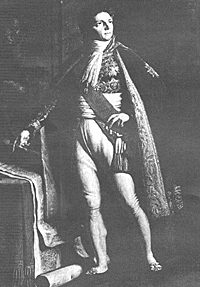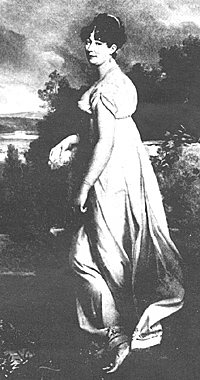A personage closely associated with Napoleon was
Berthier.
AT right, Bertier.
A great deal has been written about him. We all
know about his crucial role in making the Grande Armee
click and we don't need to expand any further on that. We
also know about his blind devotion to Napoleon and his
absolute obedience to him.
Well, not quite absolute obedience. On more than one
occasion, he had the courage to stand up to Napoleon. In
1806, on the day Napoleon had decided to execute Prince
von Hatzfeld, the governor of Berlin, because of his alleged
intelligence with Hohenlohe, Berthier had the courage to tell
him: " Your Majesty can not execute a man who belongs to
one of the best families in Berlin on so little evidence:
guessing is not acceptable, you don't want that. " And he
was able to obtain a meeting between the Princess von
Hatzfeld and the Emperor. [2]
There Were Other Times
After the Battle of Jena and
the Campaign of 1806, when Napoleon
wanted to bring his army into Poland and
tried to stimulate the enthusiasm of his
generals, Berthier did not hide their
desire - as well as his own - to return to
France. Napoleon, who at times could be
rather crude, answered: "Then you
would be happy to go and p... in the
Seine!".
In Russia, another time, the
Prince of Neuchatel, expressing the idea
that it would be wise to withdraw,
triggered an outburst from his Master:
"Go on, I don't need you, you are only
a.... Go back to France, I don't need
anyone here."
At the end of the retreat from
Russia, he had the courage to show his
master the state of decomposition of the
Grande Armee. Then, when Napoleon,
frightened by Malet's conspiracy,
decided to return to Paris, and turned the
command of what was left of the Grande
Arm6e to Murat, Berthier strongly
desired to go with Napoleon who
answered: "That is impossible, it is
necessary that you stay with the King of
Naples. I am perfectly aware that you are
good for nothing, but no one believes it
and your name has positive effect on the
army..."
But deep inside, Berthier
was obedient not only in his public life
as major-general but also in his private
life. Like all the marshals, he had been magnificently
rewarded. He had a huge fortune and that is what on
occasions drove him to desperation. One day in 1812,
Baron M6neval, Napoleon's secretary, found Berthier in
tears, moaning: "What the use of so much wealth,
mansions, land, if we have to constantly make war and
compromise all that!"
At right, La Visconti.
After the Campaign of 1797,
Berthier had met Giusippina Visconti, quickly fell in love,
and adored and adulated her. Separated from her while in
Egypt, he devoted a tent to her cult: under her portrait
burned some perfumes. [3]
La belle Visconti (the beautiful Visconti), "la betise
de Berthier" (i.e. Berthier's folly) according to Napoleon -
was Italian, and married to an "accommodating" nobleman.
The Emperor, on April 1st 1806, wrote to his major-general, sending him a copy of the Moniteur
[4] that
contained his appointment as Prince of Neuchatel: "You
can see what I have done for you. I only attach one
condition to it: that is that you should get married ... Your
passion has lasted too long ... that has become ridiculous.
I do not want an old companion in arms that posterity will
place by my side, remain the victim of such a folly.
Consequently I want you to get married; otherwise I won't
see you anymore."
Berthier was 53 years old. Embroiled with the
complexities of the Campaigns of 1806 and 1807, he resisted
by simply ignoring Napoleon's wish! But Napoleon's
patience had limits. So, the latter took the initiative and in
February 1808 - some two years after the order to marry was
given to Berthier - he asked the brother of the King of
Bavaria for thehandof his daughter Elizabeth for Berthier.
The wedding was celebrated on March 9 ... Desperate was
the unfortunate major-general! He was torn apart between
Elizabeth who was 24 but not beautiful, and la Visconti
who, mature and very shrewd, had not opposed the
marriage. In fact, she was quite sure that she could keep
control of her conquest.
To Berthier, further torn apart between his idol
Napoleon and his other idol, his mistress that Napoleon
despised, the situation appeared as hopeless. Well not
quite. Suddenly, la Visconti's husband died. If he only had
had the decency of dying earlier: "I have missed my
happiness!" exclaimed Berthier, who in his distress decided
to use a last stratagem: that was to introduce his mistress
into his household by renting for la Visconti a house
adjacent to his hotel. Surprisingly, Elizabeth went along
with the game and tolerated her husband's old passion. She
even went a step further as she decided to use the Visconti
to her own advantage. On occasion, the league of the two
women played against the husband-lover. Then, not a
spring chicken anymore, la Visconti declined. She became
obese to a point that was hard to hide and Napoleon, sarcastic to the
extreme with a woman he despised, commented on many
occasions "Ah! Toujours belle! Toujours belle!" (Ah! Still
beautiful! Still beautiful). But that did not cool off Berthier's
passion as he still cared very much for her. Finally la
Visconti became paralyzed and that was the end of
Berthier's passion.
So that tragicomic domestic drama of a menage a trois
finally ended and Elizabeth was rewarded for her patience.
She finally reestablished herself in her rightful role as
Berthier's wife. Berthier became Elizabeth's faithful
companion until his accidental death in Bamberg on June 1, 1815.
[1] We should realize
that the so-called gros-bonnets, as they were called by the
subaltern officers, too often distinguished themselves more by
their bravery than by their honesty. This is a subject to which we
will return in a future article.
 From time to time, we intend to present some, let us
say lesser known stories - but not the least interesting
about Napoleon, his marshals and generals and his
immediate family. [1]
From time to time, we intend to present some, let us
say lesser known stories - but not the least interesting
about Napoleon, his marshals and generals and his
immediate family. [1]
 For many years, that meticulous, tireless worker had
a mistress that he worshiped.
For many years, that meticulous, tireless worker had
a mistress that he worshiped.
ENDNOTES
[2] The princess
obtained the pardon of her husband. Duroc and Caulincourt
supported Berthier.
[3] Thiebault,
Memoires, (1893), p. 322.
[4] "Le Moniteur"
was the official Napoleonic journal.
Back to Empire, Eagles, & Lions Table of Contents Vol. 2 No. 4
Back to EEL List of Issues
Back to MagWeb Master Magazine List
© Copyright 1994 by Emperor's Headquarters
This article appears in MagWeb (Magazine Web) on the Internet World Wide Web.
Other articles from military history and related magazines are available at http://www.magweb.com
